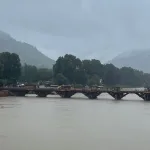Srinagar, Nov 18: Despite the implementation of smart city meters and substantial payments for electricity, residents in areas like Baghat, Hyderpora, Gulwanpura, Mehjoornagar, Barzulla, Tengpora, Nowgam, Padshahi Bagh, and other parts of Srinagar find themselves caught in the grip of a perplexing power crisis.
Feroz Mir, resident of Baghat said, “We embraced the idea of a smart city, believing it would enhance our lives. Yet, in Baghat, power cuts persist, making us question the effectiveness of the smart meters we are paying for. It’s disheartening to see the disparity between our bills and the service we receive. The bills keep increasing, but the power situation remains the same. If we are paying more for electricity, shouldn’t we be receiving a more consistent and reliable service, especially during the challenging winter months?”
Muzaffar Beigh, a resident of Hyderpora said people are facing unexpected challenges. “The promise of a smarter power grid doesn’t align with the reality of constant outages. We’re not just paying bills; we’re paying for a reliable service that seems elusive.”
Local authorities face mounting pressure to address the grievances of residents who feel shortchanged by the disparity between their financial contributions and the quality of service received. As the power crisis persists, the need for a comprehensive and transparent evaluation of the smart city initiatives becomes paramount to bridge the gap between promise and reality.
Amir Reshi, resident of Tengpora said, “a close-knit community, is united in its frustration over power cuts. Smart city advancements were supposed to bring about positive change, but we’re left wondering why our investments aren’t translating into a more stable power supply.
He further added ” We were sold the idea of a smart city, where advanced technology would bring about positive change. But despite paying hefty electricity bills, we still endure power cuts regularly. It’s perplexing and frustrating.”
The insertion of smart city meters was anticipated to revolutionize the energy distribution system, ensuring better monitoring and management. However, the implementation appears to have fallen short of expectations, leaving residents questioning the efficacy of the technological upgrades.
Principal Secretary Power Development Department, H. Rajesh Prasad provided insights into the challenges faced in Jammu and Kashmir’s power sector. He highlighted a 50% loss in the Kashmir region, primarily attributed to the absence of aerial budget cables in certain areas. People resorting to unauthorized connections and instances of pilferage contribute to significant losses, even in regions equipped with smart meters.
Prasad emphasized the financial aspect, revealing an annual expenditure of approximately 9,000 crore rupees. However, the revenue recovery stands at only 250 to 270 crore rupees monthly, leaving a substantial deficit. This shortfall results either from non-payment by consumers or pilferage, further complicating the financial dynamics of the power department.
Prasad stressed the importance of individuals refraining from pilferage, fulfilling their financial obligations by paying bills promptly, and using electricity responsibly. He shed light on the critical need for funds to purchase power, stating that power acquisition is contingent upon advance payments.
Addressing the outstanding balance issue, Prasad explained a significant backlog of 31,000 crore rupees from past transactions, which now requires repayment with interest, adding an annual interest liability of over 3,500 crores. This financial burden, coupled with the need to purchase electricity annually at a cost of 9,000 crores, poses a considerable challenge.
The Principal Secretary discussed the ongoing efforts to streamline the system, implement structural reforms, install smart meters, and upgrade infrastructure with insulated cables under the RDSS. While acknowledging the sanctioned 5,000 crore for these initiatives, he cautioned that the complete implementation would take around 2-3 years, with an additional three years for stabilization.
Prasad recognized the difficulties faced by consumers, acknowledging some genuine complaints. However, he also drew attention to citizens using electricity responsibly and paying their bills, contrasting them with those evading payment. The principal secretary urged people to understand the financial constraints, assuring that power cuts would be minimized, but in high-loss areas, limitations would be necessary.
In a humble request, Prasad encouraged people to pay their bills on time, use electricity judiciously, and report any cases of theft or misuse. He emphasized the need for consumers to be vigilant and take responsibility.
Assuring action on complaints, he concluded by stating that appropriate measures would be taken against defaulters and violators, underscoring the commitment of the department to address the power crisis and implement positive changes.





